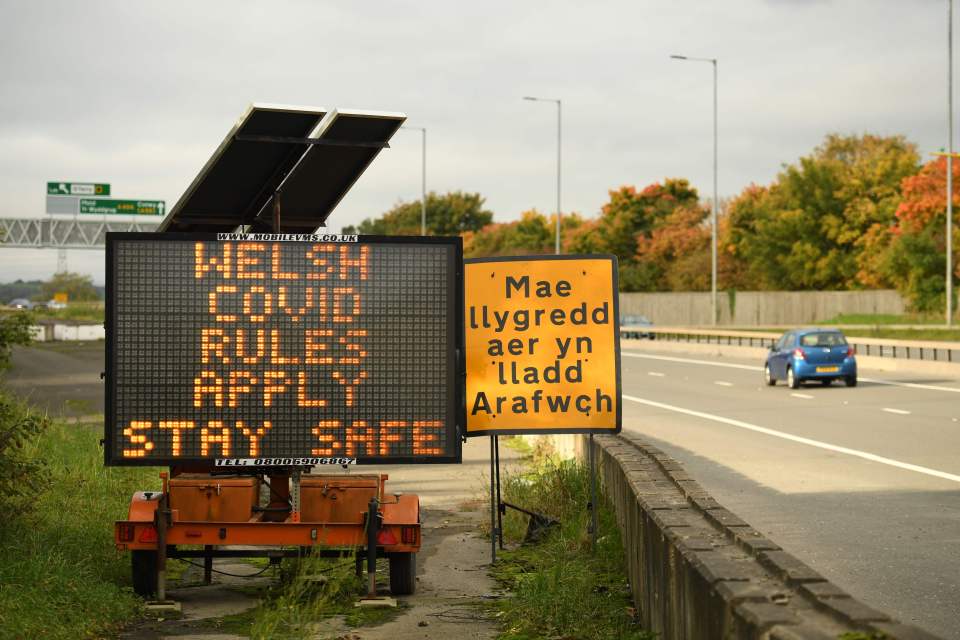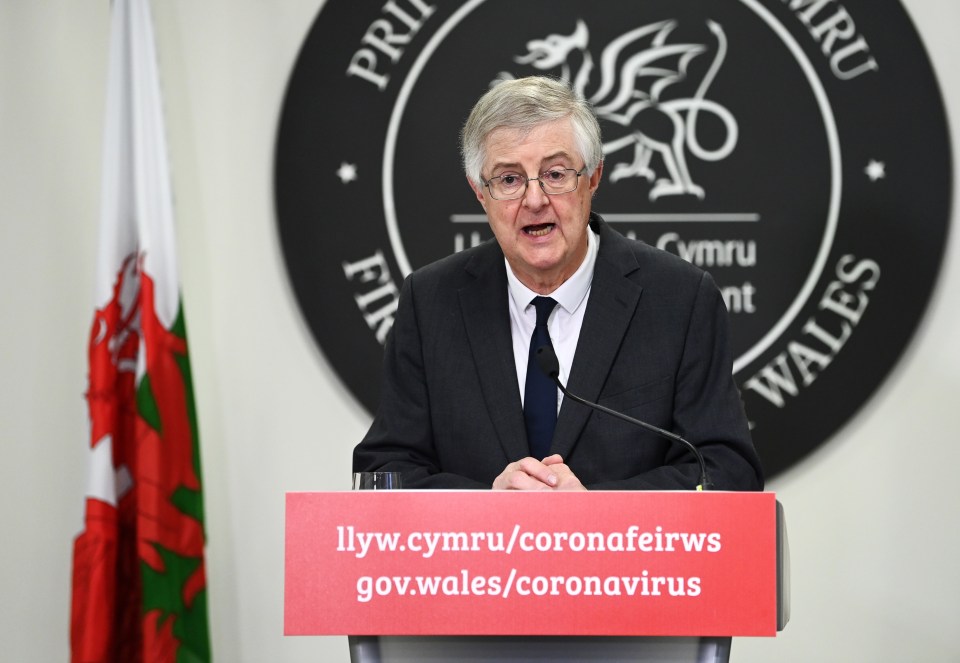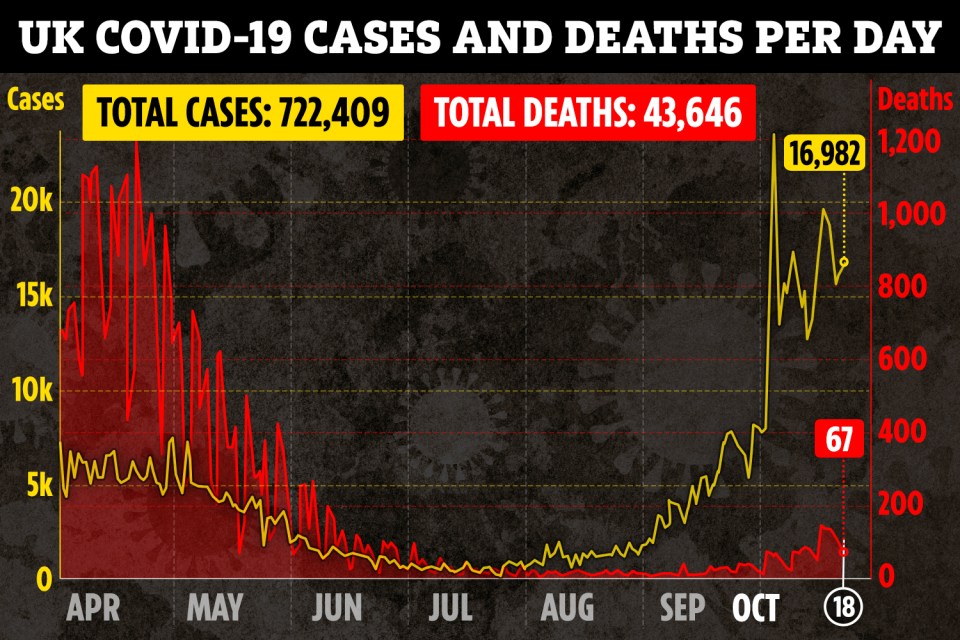WALES will be thrown into a two-week "circuit breaker" lockdown with all pubs and shops to be forced to shut from 6pm on Friday.
First Minister Mark Drakeford has announced the country will be plunged into a "fire-break" lockdown and told to stay at home until November 9.
⚠️ Read our coronavirus live blog for the latest news & updates
The lockdown will fall over the half-term holiday and extend for a week beyond that.
Primary schools will reopen as normal after the break and kids in secondary school in Year 7 and 8 will be able to go to school.
All other students will have to go back to home learning.
Mr Drakeford stressed that children were the "top priority" and childcare centres would be able to stay open throughout.
It means people in Wales will have to:
- Follow strict stay at home orders
- Pubs, restaurants and all non-essential retail will be closed
- No meeting with anyone outside your household
- No alcohol sales after 10pm
- Leisure centres and services, including gyms, will have to close
- Professional sports will be able to continue
- Hairdressers and beauty services will have to close
- No gatherings will be allowed outdoors including Halloween and fireworks on Bonfire night
The First Minister said the fire-break was the "shortest" it could be, but the narrow time frame means it will have to be "sharp and deep" to cull new infection rates.
He said this lunchtime: "There are no easy choices in front of us as the virus spreads rapidly in every part of Wales.
"We know if we do not act now it will continue to accelerate and there is a very real risk our NHS will be overwhelmed."
The First Minister warned Wales would be looking at an "open ended national lockdown" if urgent action wasn't taken.
There were 4,127 new coronavirus cases in Wales last week - an infection rate of 130 cases per 100,000.
There were almost 1,000 new coronavirus cases in Wales yesterday, and hospital admissions were up 40 per cent in the last week.
The R rate - or rate of transmission of the virus - sits between 1.1 and 1.4 in Wales.
"Between the 23rd of October and the 9th of November, everyone in Wales will be required to stay at home.
"All non-essential retail, leisure, hospitality and tourism businesses will close, just as they had to during the March lockdown."
He said: "Unless we act... even more people will die from this deadly virus."
"Of course this will not be easy, but if we act together, we will succeed."
Everyone will have to work from home, unless they are "essential workers" as in the March lockdown.
University students will also be forced to stay "at home" in their halls and accomodation and learn online.
Single parents and adults living alone will be able to join another household in a "support bubble".
The rule on no gatherings or will be relaxed for small, organised events on Remembrance Sunday.
The set of draconian measures will mean England will be the only part of the UK which won't have some form of national "circuit breaker" lockdown as Boris Johnson furiously refuses to cave to pressure to shut down the country again.
When asked if England could follow suit with a "circuit breaker" lockdown, No10 stood firm on their position.
The PM's spokesman said: “The PM continues to believe that targeted local action in those areas of high prevalence of the virus is the correct course.”.
The Welsh Government has also created a £300 million financial package to give grants to help businesses stay afloat.
Businesses eligible for rates relief will be able to access £1000 grants.
Small and medium retail, leisure and hospitality businesses forced to close will get a one off payment of up to £5000.
Welsh circuit breaker rules
- Pubs and restaurants will be closed
- All non-essential retail forced to shut up shop
- Welsh people given fresh "stay at home" orders
- No mixing with any other households indoors or outdoors
- No leaving your local area
- No alcohol will be able to be sold after 10pm
- Places of worship will close
- Community centres and libraries to be closed
- Schools will stay open for kids in Year 8 and below
Las week, Mr Drakeford set himself on a collision course with Mr Johnson by saying Wales' border would be closed to people from coronavirus hotspots in England.
Anyone breaking the border ban would even be fined £50.
But the demands fell flat when the Police Federation of England and Wales said "policing in Wales is already over-stretched due to the pandemic" and it would be difficult to enforce measures.
Northern Ireland and Scotland are both in the middle of circuit breaker lockdowns to try and get on top of new coronavirus infections after the Government's Sage committee of experts threw their support behind short national shutdowns.
Scots are unable to drink alcohol in pubs and restaurants, which all have to close at 6pm daily.
But they haven't been given the severe lockdown measures Mr Drakeford is expected to impose today.
People in Northern Ireland are also living under strict rules, with pubs, schools and restaurants forced to close for four weeks.
The dramatic introduction of a "circuit breaker" in Wales will pile further pressure onto Mr Johnson to bring one in in England.
Labour politicians, including Manchester Mayor Andy Burnham and Sir Keir Starmer, are demanding the whole country is put under tight lockdown rules for two weeks.
But over the weekend, Labour frontbencher Rachel Reeves admitted England could face a series of lockdowns to stop new infections.
Housing Secretary Robert Jenrick flatly rejected out a short lockdown this morning.
He said: "The argument for a national circuit-breaker is not one that I, personally, find, at all persuasive.
"This is to apply on a blanket level - the same approach in Nottingham, the city which my constituency is next to, where the number of cases today is well over 700, to Somerset or Herefordshire, where the number of cases per 100,000 is below 40.
Read More on The Sun
"The damage to the economy and to our broader health and wellbeing that would be brought about by a circuit-break, I think, would be very, very significant.
"And so the Government's approach is a localised, a proportionate and localised, approach for as long as there is such wide variations in infection."











